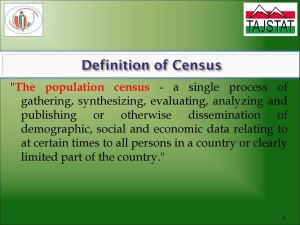What is Population Census
Population census is the counting of statistical data on an entire specific population of a group of people. In this way, its characteristics can be precisely known.
That is, census is the collection of information regarding a group of people. For example, all citizens of a nation.
These types of studies are usually used by governments to better understand how the country’s population is made up and what their needs are. Thus, it can be identified, for example, which region has a higher percentage of homes without electricity.
The data that are usually collected in a census are: age, sex, level of education, access to basic services, monthly income, characteristics of the inhabited dwelling, among others. That is, both qualitative and quantitative variables can be considered.

This is the counting of the number of people residing in a particular country. It is done on a periodic basis e.g. in Nigeria it is done every ten years. The 1991 census in Nigeria revealed that the size of her population was 88.5 million.
Reasons for Population Census
- The knowledge of the population size and distribution helps planners to plan accurately.
- The structure of the population determines the size of its labour force.
- Knowledge of a country’s population helps in comparing the welfare index of one country with another. Such index is often used as a basis of international aids and grants.
- International organizations such as the United Nations (UNO) use the size of the population of its member countries to determine their financial and other contributions.
- In many countries, the population is used in the distribution of amenities such as parliamentary seats and revenue allocation.
- Accurate knowledge of a country’s population is required for the provision and distribution of socio-economic benefits such as education and health.
- Knowledge of both the size and distribution of the population is required to promote even development of a country.
Problems of Population Census
The problems of conducting an acceptable census include the following:
- It is very costly to carry out a census exercise.
- Majority of third world countries do not have enough experts in many areas of census operations.
- There are shortages of infrastructural facilities which are required for a successful census such as maps all weather roads and poor communication facilities.
- Because most people are illiterate they can not provide accurate infonnation, such as their ages.
- Ignorance about the purpose of census affects the quality of census data.
- Over-politization of census affects the quality of census data.
- Religion and culture prevent some people from presenting themselves for counting.
Difference Between Census and Survey
Unlike surveys, censuses are not carried out on a sample, but on the entire target population.
In other words, a national census in a country of 30 million inhabitants would require interviewing all these citizens. However, for a survey, only a representative sample of, for example, 1,500 people would have to be taken.
This representative group must show the same characteristics as the universe. That is, if the average age of the population is 30 years, the sample must also meet that condition.
In any case, it can be concluded that a census is a type of survey where the entire target group is interviewed. This implies a greater logistical deployment that demands, in turn, more resources.
In this sense, it should be reiterated that, although censuses are more accurate, they are carried out less frequently than surveys because they are more expensive.